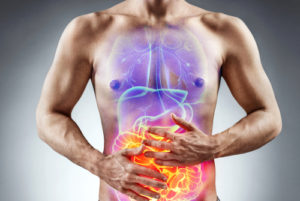How inflammation impacts your liver, thyroid, hormones, iron levels, and digestive balance
Chronic inflammation, a condition Naturopaths have been treating for centuries, has finally been scientifically recognized as a major cause of nearly every type of chronic disease, from heart disease and cancer to autoimmunity and even Alzheimer’s[1].
But the tricky thing about inflammation is very few people have been taught to recognize its early symptoms.
This is critical to disease prevention and patient empowerment, because if you can identify the warning signs of an inflammatory condition early on, it’s much easier to treat.
To start, let’s look at some symptoms of inflammation you may be experiencing right now.
- Do you feel tired?
- Have you gained weight that is difficult to lose?
- Are you retaining fluid?
- Do you have trouble sleeping?
- Are you anxious and/or depressed?
- Do you lack motivation?
- Do you have poor exercise endurance?
- Do you have trouble focusing and remembering things?
- Do you have heavy periods?
- Do you have significant breast tenderness?
- Is your voice more raspy than it used to be?
- Do you have a burning sensation in your throat?
- Do your lungs feel tight?
- Do you get bloating after eating?
- Is your hair thinning and/or dry?
- Do your nails have vertical ridges or divets?
- Do your legs hurt when you go up the stairs?
- Do you have neck and/or shoulder pain?
- Is your blood pressure inexplicably high?
- Do you have high cholesterol?
If you answered “yes” to more than one of these questions, know that is completely normal and your body’s way of telling you something is not right.
What is inflammation?
As you probably figured out from the symptom survey above inflammation is wide-spread in today’s world.
It is our body’s response to infection, toxin exposure, excess alcohol, medications, injury, excess exercise, lack of sleep, stress, poor diet, trauma, excess weight, etc.
In other words: though modern life has certainly improved human existence in many ways, it’s also created a world full of inflammatory triggers (which are avoidable, by the way).
An increased amount of a liver hormone called Hepcidin is produced as a result of inflammation.
This hormone, in turn, causes reduced absorption of iron via the digestive tract. It does this as a protective mechanism so that inflammation does not damage iron transport and storage systems.
This is important because an inappropriate release of iron could cause free radical damage and increased inflammation.
The result of increased hepcidin is an iron deficient state.
This may not be picked up on blood tests because it may not appear as a full blown anemic state.
How low iron affects your whole body
Iron is needed for oxygen transport from the lungs to the tissues of the body; for metabolism and respiration; for DNA, collagen and neurotransmitter synthesis; and for proper immune function.
So iron deficiency can cause many symptoms.
Low iron also turns on genes in the liver and muscles that promote fat storage and cause blood sugar elevation.
This can result in weight gain and metabolic syndrome.
Inflammation can damage liver membranes, which affects thyroid hormones
It’s amazing how little we think about the liver when it comes to chronic disease.
However, inflammation can damage liver cell membranes.
Why is this important?
For one, liver cell membranes are where most of our thyroid hormones are activated. It is where much of T4 converts to T3. T3 is the active form of thyroid hormone.
So, damaged liver cell membranes result in less conversion of T4 to T3 and symptoms of low thyroid hormone can result.
Thyroid hormones regulate the body’s metabolic rate, heart and digestive function, muscle control, brain health and development, and bone maintenance.
As with iron deficiency, low thyroid hormones can cause many undesirable, and seemingly unrelated symptoms. Plus, a basic TSH test (which is the thyroid test most doctors use to check for thyroid problems) only measures one thyroid hormone, TSH (not T3, T4, thyroid antibiodies, etc.).
Thus, many cases of low thyroid, hypothyroidism, or even Hashimoto’s remain undiagnosed.
But that’s not all…iron deficiency causes a decreased conversion of T3 and T4
Iron deficiency also directly causes a decreased conversion of T4 to T3 (called deiodinase activity – basically the removal of an iodine molecule. T4 has 4 iodine molecules and T3 has 3). The conversion requires an enzyme called thyroid peroxidase, which relies heavily on iron.
Without sufficient iron the whole process slows down and you end up with less active thyroid hormone.
Also, an interesting side note is that when your iron levels are low you are less likely to utilize iodine (if you are supplementing with it, to address low thyroid), which as stated above is necessary for the formation of thyroid hormone.
Low thyroid function can also lead to iron deficiency!
As a catch 22, low thyroid function can also cause iron deficiency.
Low thyroid activity causes a decrease in stomach acid, which leads to less absorption of nutrients, including iron.
Lower stomach acid also contributes to acid reflux. I know this sounds counterintuitive because the treatment for reflux is acid blockers, but low stomach acid triggers the lower esophageal sphincter to remain open, allowing acid to reflux up through the esophagus from the stomach.
You may experience burning in your throat, a raspy voice, and in the morning your lungs may feel tight, because the acid enters the respiratory passages in the night when you are laying flat.
Lowered stomach acid can cause an overgrowth of non-beneficial microbes
Lowered stomach acid can also cause an overgrowth of non-beneficial microbes in the gut.
This is because stomach acid is very antimicrobial and also because lower acid means more undigested food gets through to the small intestine and acts as a breeding ground for non-beneficial microbes.
So, conditions like SIBO (small intestinal bacterial overgrowth), H. Pylori, and candida overgrowth can result.
These conditions can also trigger the liver to produce more hepcidin and the cycle continues.
Hormonal imbalances can be the result of low thyroid function and iron deficiency
While iron deficiency can result from heavy menstrual bleeding, heavy bleeding can actually be the result of iron deficiency (another catch 22!).
Let me repeat that—you may have heavy menstrual bleeding because you are iron deficient. Also, low thyroid directly impacts hormone balance.
It causes a decreased production of progesterone and decreased production of estrogen-binding SHBG, which causes an estrogen dominant situation.
The result is symptoms like heavy bleeding and breast tenderness.
Liver stress also directly causes hormonal imbalance because the liver has to metabolize and detoxify hormones. When the liver is compromised we have more toxic forms of hormones, in particular more toxic estrogen.
Now that you have a crash course in how inflammation works, let’s re-look at that symptoms survey…
Let’s go back to that original list of questions and match them with what is out of balance (as it applies to this discussion).
Please note that many of these are also symptoms of candida overgrowth/SIBO—which can be part of the inflammatory cycle that sets off the issues with iron and thyroid; and which can be the result of issues with the thyroid (via low stomach acid production).
Or, the conditions can just plain exist concomitantly.
Also, please note that conditions other than the ones we are talking about here can cause the symptoms below.
- Do you feel tired? Low thyroid and low iron
- Have you gained weight that is hard to lose? Low thyroid and low iron
- Are you retaining fluid? Low thyroid (via lower body temperatures)
- Do you have trouble sleeping? Low thyroid and low iron
- Are you anxious and/or depressed? Low thyroid and low iron
- Do you lack motivation? Low thyroid (and iron)
- Do you have poor exercise endurance? Low iron (and thyroid)
- Do you have trouble focusing and remembering things? Low thyroid and low iron
- Do you have heavy periods? Low thyroid (leading to hormone imbalance) and low iron
- Do you have significant breast tenderness? Low thyroid (leading to hormone imbalance) and low iron
- Is your voice more raspy or gravely than it used to be? Low thyroid (via thickening of the vocal chords, called myxedema), acid reflux (via low stomach acid caused by low thyroid)
- Do you have a burning sensation in your throat? Acid reflux (low thyroid causes low acid which can cause reflux)
- Do your lungs feel tight? Acid reflux (low thyroid causes low acid which can cause reflux)
- Do you get bloated after eating? Low thyroid (via low stomach acid)
- Is your hair thinning and/or dry? Low thyroid, low iron
- Do you tend to be constipated? Low thyroid
- Is your skin dry? Low thyroid
- Do your nails have vertical ridges or divets? Low iron
- Do your legs hurt when you go up stairs? Low iron
- Do you have neck and/or shoulder pain? Low iron
- Is your blood pressure inexplicably high? Low thyroid
- Do you have high cholesterol? Low thyroid
This list is certainly not exhaustive, but it is a common picture that I see in my office and so I wanted to share the connections.
I know it can be incredibly frustrating to decipher your body’s symptoms, because such intricate biochemistry is at play underneath everything.
What you should do next
So, what do you do with all this information?
If you are getting blood tests you want to make sure you are looking, in particular, at ferritin to determine iron status.
Ferritin reflects the amount of iron stores in the body.
For the thyroid, you would want a full thyroid panel: TSH, free T3 and T4, reverse T3 (rT3 is part of overall T3 and is the braking system, while active T3 is the go signal, so it is helpful to know the levels of both), thyroglobulin and thyroid peroxidase antibodies (for autoimmune thyroid issues), and a 24-hour urine iodine test to determine iodine status.
These levels may come back within normal range but you could still have insufficiencies—which means you’re not full-blown deficient but you’re trending that way.
We can also assess via BioEnergetic testing.
With this we do not get absolute values, but we do get information on what is out of balance, why it is out of balance, and what we need to do about it.
The treatment of the above needs to be tailored to each individual’s combination of factors—taking into consideration causal factors, specific presentation of imbalance, and specific nutrient needs.
Why see a holistic physician
If you see a holistic physician like me, you’ll find that I recommend iron bisglycinate, which is a very gentle, effective and absorbable form of iron.
This can provide such relief when iron deficiency is underlying everything.
For thyroid there are a number of approaches, but some common remedies are iodine (I like iosol iodine as it is very bioavailable and safer, compared to the commonly used high-dose potassium iodide), ashwaganda, guggulipid, l-tyrosine, and selenium.
But also, we have to address the underlying causes of the low iron and/or low thyroid—the inflammatory processes going on in the body that are stressing the digestive and liver systems, and in the case of the thyroid, what may be stressing the organ directly.
It’s not enough just to say “inflammation is causing all your issues”, in naturopathic holistic medicine we look deeper as to why inflammation is occurring in the first place.
This is done on a case-by-case basis.
Your body’s symptoms are just signals, letting you know that something is out of balance. It doesn’t mean something is broke and will never work again (as is the conventional approach to thyroid dysfunction).
Contact us today
It’s not rocket science, but it does require an understanding of how everything connects, biochemically and physiologically. This is why you want to see your holistic physician.
We can help remove the blockages to the flow system and repair any dysfunction that has resulted, all with natural remedies, dietary, and lifestyle recommendations and other healing therapies.
Get in touch—we can help!
References:
1: https://www.nature.com/articles/s41591-019-0675-0



